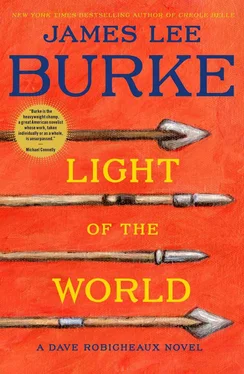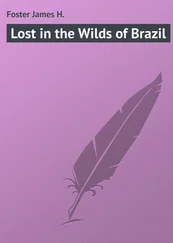If only Bertha would close her mouth for a little while. “You’re too old for it,” she said, following him out the door onto the apron of grass where they had dropped the trailer. “Do you want to be a quadriplegic? Do you want to wear a drip bag under your clothes for the rest of your life?”
“I rode Bodacious to the buzzer, woman,” he replied. “There ain’t many can say that. We used to call him the widow-maker. I rode him into a tube steak. What do you think of that?”
“Call me ‘woman’ again, and I’m going to slap you cross-eyed.”
“Bertha, I’m not exaggerating, blood is leaking out of my ears.”
“Where are you going?”
“To get a brain transplant.”
“ Please, Wyatt.”
“I got the message. Even though I am near deaf, by God, I got the message.”
“You won’t ride?”
“I don’t think I said that. You want some cotton candy or a tater pig?”
“No, I do not. I want you to act like a reasonable human being.”
“There ain’t no fun in that.”
She threw a slipper at his head.
Oh, well, he’d known worse, he consoled himself. When he was seventeen, he’d married a Mexican woman who used to blow flaming kerosene out of her mouth in a carnival. Or at least he thought he’d married her. The two of them had eaten enough peyote buttons to start a cactus farm and had woken up on top of a bus loaded with stoned hippies on their way to San Luis Potosi. He remembered a ceremony conducted by an Indian shaman dressed in feathers; he was almost sure of that. But maybe the ceremony was a funeral, because somebody had dropped a wooden casket off a mountainside, and Wyatt had seen it bounce and break apart on the rocks. Or maybe the fire-eater was in the casket. Or maybe that was her mother. It was somebody, for sure.
He had decided long ago that memory and reliving the good times weren’t all they were cracked up to be. Anyway, Bertha Phelps was a good woman. The problem was, she was too good. She worried about him day and night and made love like it was about to be outlawed, sometimes leaving him worn out in the morning and afraid she would corner him in the bedroom by midafternoon.
He bought her a tater pig whether she wanted it or not, and a great big fluffy cone of cotton candy for himself. He heard the announcer on the loudspeaker in the box above the bucking chutes tell the crowd to stand up for “The Star-Spangled Banner.” Through an aisle lined with game booths, he saw a familiar figure walking toward him, followed by three men wearing suits and shades.
Wyatt was not up for another session with a billionaire oilman who just wouldn’t let it alone, whatever “it” was. Wyatt had never given much thought to rich people; he’d always assumed they had the same vices and compulsions as everyone else but were a whole lot smarter about hiding them. He didn’t care what they were, as long as they tended to their own business, which was buying politicians and making sure the toilets flushed and the cops got paid off, and nobody told him what he could and couldn’t do.
Too late.
“I just want a couple of minutes,” Love Younger said.
“Not a good idea,” Wyatt said.
“Come on, sit down, son. Let me have my say, and I’ll be gone.”
They were standing on a grassy spot under a birch tree by the bingo concession, the grandstand not far away, buzzing with noise. “Is that Jack Shit with you?”
“That’s Jack Boyd.”
“What happened to him?” Wyatt asked.
“Excuse me, I have to rest a minute,” Younger said, easing himself down at one of the plank tables. “Age is a clever thief. It takes a little from you each day, so you’re not aware of your loss until it’s irreversible.”
Wyatt could hear the announcer in the grandstands trading jokes with one of the rodeo clowns. “Tell me what you’re after and be done with it,” he said, and sat down at the table.
“My granddaughter is dead,” Younger said. “My daughter-in-law has disappeared, and my son is dissolute and perhaps in a dangerous state of mind.”
“What’s that got to do with me?” Wyatt asked.
“Be patient. I’m trying to set some things straight without causing unnecessary harm to anyone. Have you seen my son?”
“I wouldn’t know what he looks like. What the hell is this?”
“What would you do if a great amount of money came into your hands?” Younger asked.
“I’d ask what the trade-off was, ’cause ain’t nothing comes free. Second of all, I’d probably say kiss my ass, ’cause I ain’t interested in what other people own.”
“Then you’re a rare man.”
“You didn’t answer my question about Jack Shit.”
“A man named Clete Purcel attacked him.”
“You let Louisiana Fats knock you around?” Wyatt said to Boyd.
“Listen to me, son,” Younger said.
“Take your goddamn hand off me. Don’t be calling me ‘son’ again, either.”
“The fates have not been kind to you. I want to correct that if I can. Do you understand what I’m trying to say?”
“No, I got no idea. I’m getting pretty tired of it, too. How come you always got guys like this around? People that’s been inside or belong there?”
“I try to give other men a second chance. Pap, why did he beat you? Why did he have such animus toward you?”
“Ani-what?”
“You’re part Shawnee Indian, boy. It’s in your profile. Your people were trash, but you’re a warrior. Look at my hands, look at yours. Those are hands that could break down a brick wall. How do you think you ended up the man you are? You think your genes came from your worthless father or your whore of a mother? Was it the nigger in the woodpile?”
“You get the fuck away from me, old man,” Wyatt said.
He threw his cotton candy and Bertha’s tater pig in a garbage barrel and walked behind the bucking chutes, a sound like fireworks popping in his head. He squatted in the sawdust and began buckling on his spurs.
“You’re not up, Wyatt,” a cowboy said.
“Hell I ain’t.”
“I’m just doing my job.”
Wyatt lifted his eyes to the cowboy’s face. “Do I got to say it again?”
He climbed on top of the chute while his horse was loaded, then eased down on its back, hooking his left palm through the braided suitcase handle on the bucking rig. Like most rough stock, the horse was almost feral, walleyed, jerking up its head, its body quivering with fear and rage at the confines of the chute, knocking against the wood sides, trying to kick itself free of the flank strap.
Wyatt fixed his hat and steadied himself. “Outside!” he said.
He was once again borne aloft, his legs up, his body springing backward almost to the croup, the rowels of his spurs slashing down, the twelve hundred pounds of gelding thudding so hard into the sod that Wyatt thought his sphincter had been broken and he was about to urinate into his athletic supporter. He’d drawn Buster’s Boogie, a hot-wired gelding that had crippled a rider for life at the Russian River Rodeo in California. Buster’s Boogie sunfished twice, then corkscrewed and twisted sideways unexpectedly, all within three seconds. Wyatt saw the grandstand begin rotating around him, then the bucking chutes, then the Ferris wheel, then the greased faces of the clowns by the rubber barrel, as though he were stationary and the entire world, even the stars embroidered on the pink sky, had all become part of a giant Tilt-A-Whirl that had gone out of control and was doing things that had never happened to him before.
He felt the gelding explode under him with renewed energy, prying Wyatt’s clamped legs loose from its sides, flinging him high in the air, his shoulders and back still hunched in a rider’s position, the suitcase handle slipping beyond his reach, the ground suddenly coming up like a fist, the blat of the eight-second buzzer coming too late, almost like a pent-up mockery that had never been allowed to express itself.
Читать дальше












